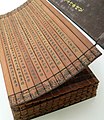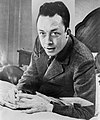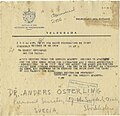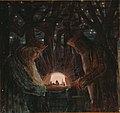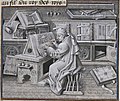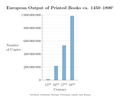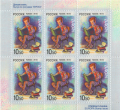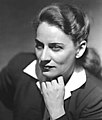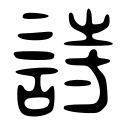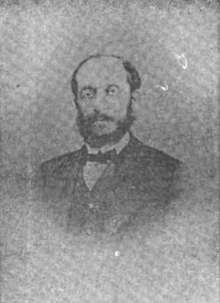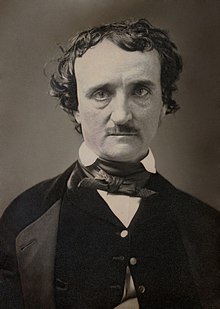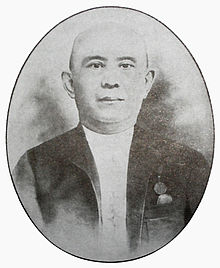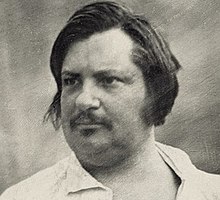Portal:Literature
Introduction

Literature is any collection of written work, but it is also used more narrowly for writings specifically considered to be an art form, especially novels, plays, and poems. It includes both print and digital writing. In recent centuries, the definition has expanded to include oral literature, much of which has been transcribed. Literature is a method of recording, preserving, and transmitting knowledge and entertainment. It can also have a social, psychological, spiritual, or political role.
Literary criticism is one of the oldest academic disciplines, and is concerned with the literary merit or intellectual significance of specific texts. The study of books and other texts as artifacts or traditions is instead encompassed by textual criticism or the history of the book. "Literature", as an art form, is sometimes used synonymously with literary fiction, fiction written with the goal of artistic merit, but can also include works in various non-fiction genres, such as biography, diaries, memoirs, letters, and essays. Within this broader definition, literature includes non-fictional books, articles, or other written information on a particular subject. (Full article...)
General images -
"A Song for Simeon" is a 37-line poem written in 1928 by American-English poet T. S. Eliot. It is one of five poems that Eliot contributed to the Ariel poems series of 38 pamphlets by several authors published by Faber and Gwyer. "A Song for Simeon" was the sixteenth in the series and included an illustration by avant garde artist Edward McKnight Kauffer. The poems, including "A Song for Simeon", were later published in both the 1936 and 1963 editions of Eliot's collected poems.
In 1927, Eliot had converted to Anglo-Catholicism and his poetry, starting with the Ariel Poems, took on a decidedly religious character. "A Song for Simeon" is seen by many critics and scholars as a discussion of the conversion experience. In the poem, Eliot retells the story of Simeon from the second chapter of the Gospel of Luke, a just and devout Jew who encounters Mary, Joseph and the infant Jesus entering the Temple of Jerusalem. Promised by the Holy Ghost that he would not die until he had seen the Saviour, Simeon sees in the infant Jesus the Messiah promised by the Lord and asks God to permit him to "depart in peace" (Luke 2:25–35). Several critics have debated whether Eliot's depiction of Simeon is a negative portrayal of a Jewish figure and evidence of anti-Semitism on Eliot's part.
Selected excerpt
| “ | It is impossible to say how first the idea entered my brain, but, once conceived, it haunted me day and night. Object there was none. Passion there was none. I loved the old man. He had never wronged me. He had never given me insult. For his gold I had no desire. I think it was his eye! Yes, it was this! One of his eyes resembled that of a vulture—a pale blue eye with a film over it. Whenever it fell upon me my blood ran cold, and so by degrees, very gradually, I made up my mind to take the life of the old man, and thus rid myself of the eye forever. | ” |
| — Edgar Allan Poe, "The Tell-Tale Heart" | ||
More Did you know
- ... that John Donne's Devotions upon Emergent Occasions is one of only seven printed works he acknowledged authorship of?
- ... that Amir Hamzah left one of his fifty poems in his prison cell before being executed?
- ... that the Hongwu Emperor was so fond of Gao Ming's play The Lute that he ordered it to be performed every day at court?
- ... that both the Star Trek novels The Tears of the Singers and Uhura's Song included Uhura as a main character as the authors thought she was underdeveloped in the show?
- ... that author Colum McCann described the subject of his 2003 novel Dancer, Rudolf Nureyev, as "a monster"?
Selected illustration
Did you know (auto-generated) -

- ... that the poet Fernando Pessoa considered Alberto Caeiro, one of his own heteronyms, to be his master?
- ... that a poem by Moses da Rieti includes an encyclopedia of the sciences, a Jewish paradise fantasy, and a post-biblical history of Jewish literature?
- ... that scholar Mohja Kahf stated that there is no Syrian literature?
- ... that the literary movement of créolie tries to integrate the identity of Réunion with France?
- ... that the cultural scholar Hermann Bausinger wrote a book about the history of literature from Swabia from the 18th century to the present, published for his 90th birthday?
- ... that there is a Gambian literature even though it has been argued that there is "minimal basis" for its existence?
Today in literature
- 1865 - Mark Twain's story The Celebrated Jumping Frog of Calaveras County is published in the New York Saturday Press.
- 1874 - Clarence Day, American author born
- 1889 - William Allingham, Irish author died
- 1906 - Klaus Mann, German writer born
- 1922 - Marcel Proust, French novelist died
- 1926 - George Bernard Shaw refuses to accept the money for his Nobel Prize, saying, "I can forgive Alfred Nobel for inventing dynamite, but only a fiend in human form could have invented the Nobel Prize."
- 1939 - Margaret Atwood, Canadian writer (Surfacing, The Handmaid's Tale) born
- 1941 - Émile Nelligan, Quebec poet died
- 1946 - Alan Dean Foster, American author born
- 1952 - Paul Eluard, French poet died
- 1957 - Seán Mac Falls, Irish-born poet born
- 1966 - Jorge Camacho, Spanish poet born
- 1985 - Calvin and Hobbes, a comic strip by Bill Watterson, is first published.
- 1999 - Paul Bowles, American novelist died
Topics
| Literature: | History of literature · History of the book · Literary criticism · Literary theory · Publishing |
| By genre: | Biography · Comedy · Drama · Epic · Erotic · Fable · Fantasy · Historical fiction · Horror · Mystery · Narrative nonfiction · Nonsense · Lyric · Mythopoeia · Poetry · Romance · Satire · Science fiction · Tragedy · Tragicomedy · more... |
| By region: | African literature · Asian · European · Latin American · North American · Oceanic |
| By era: | Ancient literature · Early medieval · Medieval · Renaissance · Early Modern · Modern |
| By century: | 10th century in literature · 11th · 12th · 13th · 14th · 15th · 16th · 17th · 18th · 19th · 20th · 21st |
| Recent: | 2018 in literature· 2017 · 2016 · 2015 · 2014 · 2013 · 2012 · 2011 · 2010 · 2009 · 2008 · 2007 · more... |
Categories
Related portals
| Concepts: | |
| Genres: | |
| Religions: |
Things you can do
Related WikiProjects
WikiProjects related to literature:
| Concepts: | Biographies · Books · Comics · Magazines · Manga · Novels · Poetry · Short stories · Translation studies |
| Genres: | Alternate history · Children's literature · Crime · Fantasy · Horror · Mythology · Romance · Science fiction |
| Authors: | Honoré de Balzac · Roald Dahl · William Shakespeare |
| Series: | Artemis Fowl · Chronicles of Narnia · Discworld · Harry Potter · His Dark Materials · Hitchhiker's Guide to the Galaxy · Inheritance Cycle · James Bond · King Arthur · Middle-earth · Percy Jackson · Redwall · A Series of Unfortunate Events · Shannara · Sherlock Holmes · A Song of Ice and Fire · Star Wars · Sword of Truth · Twilight · Warriors · Water Margin · Wizard of Oz |
| Regions: | Australian literature · Indian literature · Persian literature |
Associated Wikimedia
The following Wikimedia Foundation sister projects provide more on this subject:
-
Commons
Free media repository -
Wikibooks
Free textbooks and manuals -
Wikidata
Free knowledge base -
Wikinews
Free-content news -
Wikiquote
Collection of quotations -
Wikisource
Free-content library -
Wikiversity
Free learning tools -
Wiktionary
Dictionary and thesaurus


